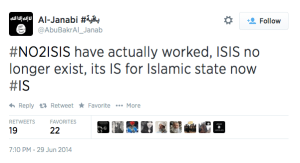While it’s known the Iranian Quds Force is aiding the Iraqi army and American armed drones currently patrol the skies above Baghdad, the list entities fighting the Islamic State (IS, formerly ISIS) in Iraq just got a virtual addition. In a YouTube video message, an Anonymous splinter group called The Anonymous Message sets out the reasoning behind “Operation NO2ISIS,” a hacking campaign targeting the cyber infrastructure of states sponsoring IS militants.
Though regional actors like the Iranians and Saudis see themselves as engaging in acrucial proxy war defending their geopolitical sphere of influence, Anonymous says it’s acting on behalf of defenseless Iraqi citizens.
“The Iraqi people have gone through almost two weeks of sheer terror most of us will never know nor experience,” said the usual Guy Fawkes-mask wearing graphic in an automated audio voice. “These savages who have no religion or morality are bent on burning everything in their path, killing and pillaging as they go. They must be stopped.”
The video claims suspected IS hackers took control of their @TheAnonMessage Twitter account, tweeting graphic photos of an IS assault near Baghdad. The spokesperson in the video apologizes for the hack and says “steps have been taken” to secure their account from “future attempted hacks.”
Besides alleging that Al-Jazeera is a supporter of IS, claiming the Middle East media outfit tarnished its “reputation by spewing your lies and your treasonous support to ISIS” and who “will not escape us,” Anonymous singles out three states for their alleged backing of the Islamic extremist group.
“To the state of Qatar, Turkey, and the Kingdom of Saudi Arabia; you will not escape our wrath. Evidence shows your continued support and supply to ISIS. If this does not promptly stop, we will be forced to unleash our entire legion against your pathetic excuse of a cyber-security,” said the message.
Courtesy of an unnamed source, Forbes is reporting that Anonymous is targeting IS sponsors because the group and its infrastructure has a limited virtual footprint vulnerable to their attacks. “We are unable to target ISIS because they predominately fight on the ground. But we can go after the people or states who fund them,” the source told Forbes contributor Jasper Hamill.
The same source claimed the style of attacks by the hackers responsible for infiltrating the @TheAnonMessage account were very similar to tactics employed by the Syrian Electronic Army—a group responsible for attacking the New York Times, Reuters, and the costly AP tweet claiming Barack Obama was injured by an explosion in the White House. According to Forbes claims by the Anonymous splinter group of a potential link-up between IS and the SEA, is an interesting development in a conflict that could seep into virtual battle spaces.
The Anonymous group isn’t alone. Fresh from a jihadist brand-name change over the weekend (formerly the Islamic State in Iraq and Syria now just the “Islamic State” after declaring their very own Caliphate in northern Iraq), a hashtag belatedly emerged in Iraq in June—#No2ISIS—to combat the aggressive ISIS social media campaigns. The hashtag also seems to be the inspiration behind the Anonymous name for its operation targeting IS supporters.
But IS has so far shown little respect for the #No2ISIS hashtag, with online supporters mocking it. One suspected fighter under the moniker Al-Janabi, referred to the hashtag, inferring it was late to the online party:

Another active IS linked Twitter user tweeted similarly a week earlier, claiming the hashtag ignored Shiite war crimes:

Ultimately, the Anonymous Message video may amount to nothing, especially as the hacktivist organization continues to go through a bit of an identity crisis. Either way, Qatar, Saudi Arabia, and Turkey should learn from recent Anonymous hacks and take precautions or expect some egg in the face.


